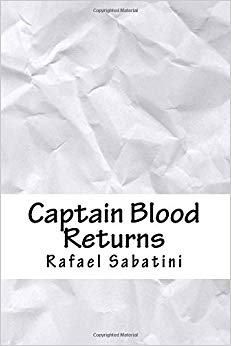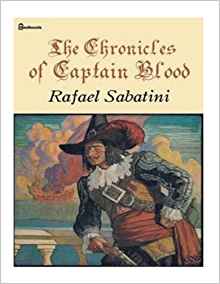-
The Sea-Hawk
Rafael Sabatini
eBookSet in the late 16th century, this pirate tale follows a Cornish sea-faring gentleman, Sir Oliver Tressilian, as he is villainously betrayed by his jealous brother. Forced to serve as a slave on a Spanish galley, Sir Oliver is liberated by Barbary pirates, whom he joins under the name 'Sakr-el-Bahr', the hawk of the sea, and swears vengeance against his brother.
-
The Sea Hawk
Rafael Sabatini
eBook (, July 6, 2016)Set against the backdrop of the Spanish invasion of England during the reign of Elizabeth I, The Sea Hawk is a classic of the pirate genre. Sir Oliver Tressilian is betrayed by a jealous half-brother and forced to serve as a slave on a galley. He is liberated when the ship is hijacked by Barbary pirates. Sir Oliver joins the pirates, gaining the name "Sakr-el-Bahr" (the hawk of the sea), and swears vengeance against his brother.The book was the basis for The Sea Hawk, the popular 1940 Errol Flynn swashbuckler. This new digital edition of The Sea Hawk by Rafael Sabatini includes an image gallery.
-
CAPTAIN BLOOD
Rafael Sabatini
eBookNone
-
Scaramouche
Rafael Sabatini
eBook (Jovian Press, Dec. 13, 2017)Once he was Andre-Louis Moreau, a lawyer raised by nobility, unconcerned with the growing discontent among France's lower class - until his friend was mercilessly struck down by a member of the aristocracy. Now he is Scaramouche. Speaking out against the unjust French government, he takes refuge with a nomadic band of actors and assumes the role of the clown Scaramouche - a comic figure with a very serious message... Set during the French Revolution, this novel of swashbuckling romance is also a thought-provoking commentary on class, inequality, and the individual's role in society - a story that has become Rafael Sabatini's enduring legacy.
-
Rafael Sabatini - Scaramouche
Rafael Sabatini
Paperback (CreateSpace Independent Publishing Platform, Sept. 21, 2016)A romantic tale of a young aristocrat's adventures during the French Revolution. At one point the hero joins a theater troupe to portray ''Scaramouche''. He also becomes a lawyer, a politician, and a lover, confounding his enemies with his elegant oration and precise swordsmanship. An excellent swashbuckler!
-
Captain Blood Returns
Rafael Sabatini
Paperback (CreateSpace Independent Publishing Platform, )None
-
The Tavern Knight
Rafael Sabatini
eBookNone
-
The Life of Cesare Borgia
Rafael Sabatini
language (, May 31, 2020)This is no Chronicle of Saints. Nor yet is it a History of Devils. It is a record of certain very human, strenuous men in a very human, strenuous age; a lustful, flamboyant age; an age red with blood and pale with passion at white-heat; an age of steel and velvet, of vivid colour, dazzling light and impenetrable shadow; an age of swift movement, pitiless violence and high endeavour, of sharp antitheses and amazing contrasts.To judge it from the standpoint of this calm, deliberate, and correct century—as we conceive our own to be—is for sedate middle-age to judge from its own standpoint the reckless, hot, passionate, lustful humours of youth, of youth that errs grievously and achieves greatly.So to judge that epoch collectively is manifestly wrong, a hopeless procedure if it be our aim to understand it and to be in sympathy with it, as it becomes broad-minded age to be tolerantly in sympathy with the youth whose follies it perceives. Life is an ephemeral business, and we waste too much of it in judging where it would beseem us better to accept, that we ourselves may come to be accepted by such future ages as may pursue the study of us.But if it be wrong to judge a past epoch collectively by the standards of our own time, how much more is it not wrong to single out individuals for judgement by those same standards, after detaching them for the purpose from the environment in which they had their being? How false must be the conception of them thus obtained! We view the individuals so selected through a microscope of modern focus. They appear monstrous and abnormal, and we straight-way assume them to be monsters and abnormalities, never considering that the fault is in the adjustment of the instrument through which we inspect them, and that until that is corrected others of that same past age, if similarly viewed, must appear similarly distorted.Hence it follows that some study of an age must ever prelude and accompany the study of its individuals, if comprehension is to wait upon our labours. To proceed otherwise is to judge an individual Hottentot or South Sea Islander by the code of manners that obtains in Belgravia or Mayfair.Mind being the seat of the soul, and literature being the expression of the mind, literature, it follows, is the soul of an age, the surviving and immortal part of it; and in the literature of the Cinquecento you shall behold for the looking the ardent, unmoral, naïve soul of this Renaissance that was sprawling in its lusty, naked infancy and bellowing hungrily for the pap of knowledge, and for other things. You shall infer something of the passionate mettle of this infant: his tempestuous mirth, his fierce rages, his simplicity, his naïveté, his inquisitiveness, his cunning, his deceit, his cruelty, his love of sunshine and bright gewgaws.To realize him as he was, you need but to bethink you that this was the age in which the Decamerone of Giovanni Boccaccio, the Facetiae of Poggio, the Satires of Filelfo, and the Hermaphroditus of Panormitano afforded reading-matter to both sexes. This was the age in which the learned and erudite Lorenzo Valla—of whom more anon—wrote his famous indictment of virginity, condemning it as against nature with arguments of a most insidious logic. This was the age in which Casa, Archbishop of Benevento, wrote a most singular work of erotic philosophy, which, coming from a churchman’s pen, will leave you cold with horror should you chance to turn its pages. This was the age of the Discovery of Man; the pagan age which stripped Christ of His divinity to bestow it upon Plato, so that Marsilio Ficino actually burnt an altar-lamp before an image of the Greek by whose teachings—in common with so many scholars of his day—he sought to inform himself.
-
The Black Swan
Rafael Sabatini
Leather Bound (Easton Press, March 15, 2013)Factory Sealed - Shrink Wrapped
-
Captain Blood
Rafael Sabatini
eBook (, July 9, 2016)Captain Blood is one of the great pirate stories. First published in 1922, Rafael Sabatini’s novel has never been out of print. It was the basis for the hit Warner Bros. movie Captain Blood (1935), starring Errol Flynn. Although Blood is a fictional character, much of the historical background of the novel is based on fact. Blood is loosely based on Henry Pitman, a surgeon who tended the wounded Monmouth rebels and was sentenced to penal transportation to Barbados where he escaped and was captured by pirates. Unlike the fictional Blood, Pitman did not join them, and eventually made his way back to England where he wrote a popular account of his adventures. For Blood's life as a buccaneer, author Rafael Sabatini used several models, including Henry Morgan and the work of Alexandre Exquemelin, for historical details. This new digital edition of Captain Blood includes an image gallery.
-
The Chronicles of Captain Blood
Rafael Sabatini
Paperback (CreateSpace Independent Publishing Platform, Feb. 20, 2018)None
-
Captain Blood
Rafael Sabatini
Mass Market Paperback (Bantam Books, Aug. 1, 1976)None